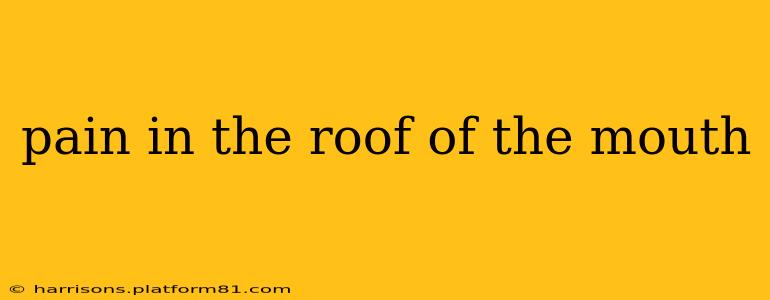Pain in the roof of the mouth, also known as palatal pain, can be a bothersome and sometimes debilitating experience. The roof of your mouth, or palate, is a complex structure comprising both hard and soft tissues, making pinpointing the cause of pain crucial for effective treatment. This comprehensive guide explores various reasons behind palatal pain, helping you understand your symptoms and seek appropriate medical attention.
What Causes Pain in the Roof of My Mouth?
The causes of pain in the roof of the mouth are diverse and range from minor irritations to more serious underlying conditions. Here are some common culprits:
- Minor Injuries: Accidental burns from hot food or drinks, biting your palate, or irritating it with sharp objects are frequent causes of temporary pain. These usually resolve on their own within a few days.
- Mouth Sores (Aphthous Ulcers): These small, painful ulcers often appear on the soft palate or inside the cheeks. While their exact cause is unknown, stress, hormonal changes, and nutritional deficiencies are suspected triggers.
- Canker Sores: Similar to aphthous ulcers, canker sores are small, shallow lesions that can occur on the palate and cause significant discomfort. These usually heal within 1-2 weeks without specific treatment.
- Thrush (Oral Candidiasis): A fungal infection caused by an overgrowth of Candida yeast, thrush manifests as white patches or lesions on the palate, often accompanied by burning or pain. This is particularly common in individuals with weakened immune systems.
- Dry Mouth (Xerostomia): Lack of saliva can lead to dryness and irritation of the palate, resulting in discomfort and a burning sensation. This can be a side effect of certain medications or underlying medical conditions.
- Dental Work: Recent dental procedures, such as fillings, crowns, or dentures, can sometimes cause temporary irritation or pain in the palate.
- Allergies: Allergic reactions to certain foods or substances can sometimes cause swelling and irritation of the palate.
- Infections: Viral or bacterial infections in the mouth can lead to pain and inflammation in the palate.
- Medications: Some medications can have side effects that include mouth dryness or irritation.
- Systemic Diseases: In rare cases, pain in the palate can be a symptom of more serious underlying medical conditions such as lupus or Sjögren's syndrome. These conditions require specialized medical attention.
- Cancer: While less common, persistent or unusual pain in the palate could, in rare instances, be a symptom of oral cancer. This necessitates immediate consultation with a doctor or dentist.
What are the Symptoms of Palatal Pain?
Symptoms can vary depending on the underlying cause but often include:
- Sharp or burning pain: This is a common symptom of mouth sores or thrush.
- Dull ache: This may be associated with dryness or irritation.
- Soreness: This can be a symptom of minor injuries or infections.
- Swelling: Swelling in the palate can accompany infections or allergic reactions.
- White or red patches: These can indicate thrush or other infections.
- Difficulty swallowing or chewing: This can be a symptom of more serious conditions.
How is Pain in the Roof of the Mouth Treated?
Treatment depends on the underlying cause. For minor injuries and mouth sores, over-the-counter pain relievers and oral rinses may provide relief. Thrush often requires antifungal medications. Dry mouth can be managed with increased fluid intake, saliva substitutes, and addressing any underlying medical conditions. More serious conditions necessitate specific treatments determined by a healthcare professional.
How Long Does Pain in the Roof of the Mouth Last?
The duration of palatal pain varies significantly depending on the cause. Minor injuries typically heal within a few days, while mouth sores might take 1-2 weeks. Thrush and other infections may require longer treatment periods. Persistent pain warrants a thorough medical evaluation.
When Should I See a Doctor or Dentist for Roof of Mouth Pain?
You should consult a doctor or dentist if:
- The pain is severe or persistent.
- You have difficulty swallowing or chewing.
- You notice any unusual swelling, redness, or lesions in your mouth.
- The pain is accompanied by fever or other systemic symptoms.
- You suspect a serious underlying medical condition.
This information is for general knowledge and does not constitute medical advice. Always seek professional medical advice for any health concerns. Prompt diagnosis and appropriate treatment are essential for managing palatal pain effectively and addressing any underlying health issues.
